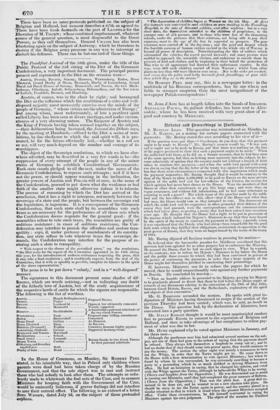In the House of Commons, on Monday, Sir ROBERT PEEL
illtated, in his inimitable way, that in Poland only children whose parents were dead had been taken charge of by the Russian Government, and that the sole object was to rear and instruct "those who had nobody to look after them. The attempts so sedu- lously made to whitewash the foul acts of the Czar, and to censure Ministers for keeping faith with the Government of the Czar, would be eminently ludicrous, if graver feelings did not interfere to mar their natural effect. The following is an extract of a letter from Warsaw, dated July ad, on the subject of these pretended crphans. "The -deportation of children began at Warsaw en the 5th May. At first this Measure was restricted to such children as Were residing in the Foundling Hospital, to the sons of deceased soldietrs and other orphans ; but in a very short time, the 'deportation extended to ;he children of proprietors, to the younger sons of sick persons, a* to those "Who were free of the elementary schools, under the pretence that their relations, not being able to pay them expenses, must in the eye of the law be regarded as paupers. The poor creatures were carried off in the day-time ; and the grief and despair which this horrible caravan of human victims excited in the whole city of Warsaw is beyond all power of description. Notwithstanding the files of soldiers which surrounded the vehicles, the crowd pressed fin ward ; and many persons were enabled to approach the miserable victims, and endeavour to console them by presents of food and clothes, and by imploring in their behalf the protection of Him who to all appearance had deserted their unfortunate country. In this way, were 600 male children carried off from Warsaw ; whilst from other places no less than 800 were likewise sent away. Nor is the order yet revoked; and every day the police send to the barracks fresh foundlings, or poor chil- dren which they see in the streets."' Sir ROBERT PEEL may say, this is a newspaper letter: in the multitude of his Russian correspondents, has he one who is not liable to stronger suspicion than the most insignificant of the newspaper Polish correspondents ?



























 Previous page
Previous page